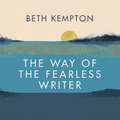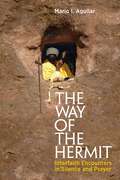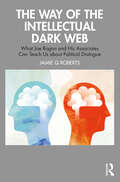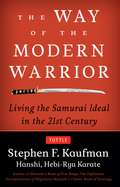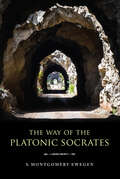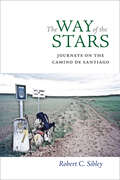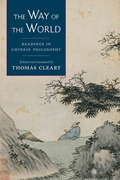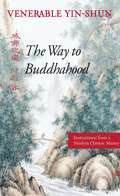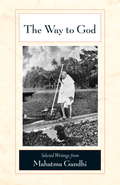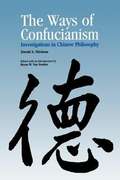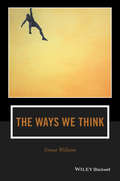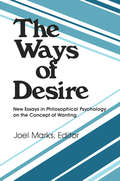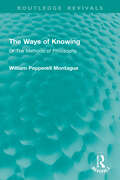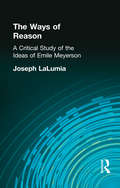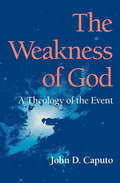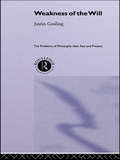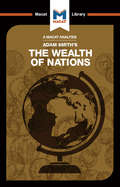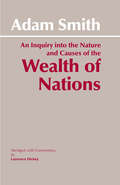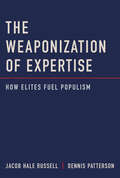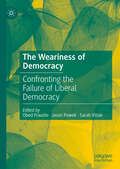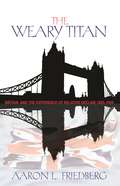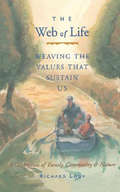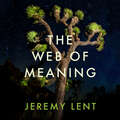- Table View
- List View
The Way of the Fearless Writer: Ancient Eastern wisdom for a flourishing writing life
by Beth KemptonA revolutionary approach to writing inspired by ancient Eastern wisdom, from the bestselling author of Wabi SabiJoin author and Japanologist Beth Kempton on a sacred journey to uncover the secrets of fearless writing which have lain buried in Eastern philosophy for two thousand years.In a radical departure from standard advice and widely-held assumptions about the effort and suffering required for creative success, The Way of the Fearless Writer will show you there is another way to thrive - a path of trust, ease, freedom and joy.Learn how to free your mind so your body can create, transform your relationship with fear, dissolve self-doubt, shift writer's block, access your true voice and bravely share your words with the world.This profound book reveals the deep connections between mind, body, spirit, breath and words. Offering a rare insight into the writing life and a host of fresh and original exercises, it will open your eyes to writing as a direct connection to life itself.Welcome to The Way of the Fearless Writer.
The Way of the Hermit: Interfaith Encounters in Silence and Prayer
by Mario I. AguilarAt first sight the lives of hermits, living in solitude and committed to a life of prayer and contemplation seems to be a world apart of the active practice of interfaith dialogue. Yet, there is a long tradition of seeking the divine together and thus making a contribution to better mutual understanding and an active contribution to peace between Christianity, Hinduism and Buddhism in India. Drawing on his experience of travelling to some of India's holy places, the life and work of writers like Thomas Merton, Charles de Foucauld and Abishaktanda and being himself a Benedictine hermit and Professor of Divinity at the University of St Andrews, Mario Aguilar opens up new possibilities for dialogue between three of the world's major religions in today's world. He shows how his own experience of an eremitic life has brought him into deep communion with pilgrims of other faiths, be it through shared silence or listening to each other's experience, through reading sacred scriptures together, through poetry or interfaith worship that draws on practices and texts from Hinduism, Buddhism and Christianity. This is a book for all engaged in interfaith dialogue and seeking to explore how spiritualities of silence, contemplation and prayer can make a contribution to peace and harmony in the world today.
The Way of the Intellectual Dark Web: What Joe Rogan and His Associates Can Teach Us about Political Dialogue
by Jamie Q RobertsRoberts presents a rigorous and accessible assessment of the Intellectual Dark Web’s origins, shared philosophy, cultural importance, and limitations. Since the mid-2010s, the Intellectual Dark Web (IDW) has been an unprecedented cultural and intellectual phenomenon. Using primarily podcasts and YouTube videos, a new generation of public intellectuals has appeared, loosely coalesced, and gained a vast global audience. This movement has encompassed a range of individuals, notably Joe Rogan, Jordan Peterson, Eric and Bret Weinstein, Ben Shapiro, Heather Heying, and Sam Harris. Other names more broadly associated with the grouping have included Steven Pinker, Jonathan Haidt, Elon Musk, Niall Ferguson, and Stephen Fry. There is a sprawling and ever-growing list of those who have appeared on IDW podcasts and videos, started their own podcasts along similar lines, and share a general ethos. It is a dispersed movement, but a significant one, given the reach of these various online outlets is in the millions globally. Roberts draws together and synthesises the core ideas espoused by the members of this movement and critically assesses its origins, coherence, and the impact it has had on politics and public discourse. He asks – to what extent has the IDW lived up to its professed goal of moving beyond polarisation and radicalisation? An insightful read both for followers of the IDW looking for a coherent and critical overview and for students of popular culture looking to understand this massive but decentralised popular intellectual movement.
The Way of the Modern Warrior
by Stephen F. Kaufman[The Way of the Modern Warrior is an explanation of the ethos of Japan's samurai warriors, practiced for over 1000 years. The author, Hanshi Stephen Kaufman, has been a warrior for 50 years,] first as a member of the military, then as an advisor to the military, and finally [as one of the world's most distinguished martial artists. In his years of experience he has collected the wisdom that comes from lessons learned and lessons taught. The 55 precepts in his new book are result of those years of experience and they will guide the modern day warrior as they devote energy and creativity to their lives.] These precepts include Kaufman's insights about Arrogance; Ease and Grace; Wise Men and Evil; Being Genuine; and Shame and the Glory. [The Way of the Modern Warrior is an essential handbook for the warrior who lives by honor, duty and service.]
The Way of the Modern Warrior
by Stephen F. Kaufman[The Way of the Modern Warrior is an explanation of the ethos of Japan's samurai warriors, practiced for over 1000 years. The author, Hanshi Stephen Kaufman, has been a warrior for 50 years,] first as a member of the military, then as an advisor to the military, and finally [as one of the world's most distinguished martial artists. In his years of experience he has collected the wisdom that comes from lessons learned and lessons taught. The 55 precepts in his new book are result of those years of experience and they will guide the modern day warrior as they devote energy and creativity to their lives.] These precepts include Kaufman's insights about Arrogance; Ease and Grace; Wise Men and Evil; Being Genuine; and Shame and the Glory. [The Way of the Modern Warrior is an essential handbook for the warrior who lives by honor, duty and service.]
The Way of the Modern Warrior
by Stephen F. Kaufman[The Way of the Modern Warrior is an explanation of the ethos of Japan's samurai warriors, practiced for over 1000 years. The author, Hanshi Stephen Kaufman, has been a warrior for 50 years,] first as a member of the military, then as an advisor to the military, and finally [as one of the world's most distinguished martial artists. In his years of experience he has collected the wisdom that comes from lessons learned and lessons taught. The 55 precepts in his new book are result of those years of experience and they will guide the modern day warrior as they devote energy and creativity to their lives.] These precepts include Kaufman's insights about Arrogance; Ease and Grace; Wise Men and Evil; Being Genuine; and Shame and the Glory. [The Way of the Modern Warrior is an essential handbook for the warrior who lives by honor, duty and service.]
The Way of the Platonic Socrates (Studies in Continental Thought)
by S. Montgomery Ewegen“This extraordinary new work” by the philosopher and author of Plato’s Cratylus “has given us nothing less than a radically new Socrates” (Michael Naas, author of Plato and the Invention of Life).Who is Socrates? While most readers know him as the central figure in Plato’s work, he is hard to characterize. In this book, S. Montgomery Ewegen opens this long-standing and difficult question once again. Reading Socrates against a number of Platonic texts, Ewegen sets out to understand the way of Socrates. Looking closely at the Socrates that emerges from the dramatic and philosophical contexts of Plato’s works, Ewegen considers questions of withdrawal, retreat, powerlessness, poverty, concealment, and release and how they construct a new view of this powerful but strange and uncanny figure. Ewegen’s withdrawn Socrates forever evades rigid interpretation and must instead remain a deep and insoluble question.
The Way of the Stars: Journeys on the Camino de Santiago
by Robert C. SibleySince medieval times, pilgrimages have been a popular religious or spiritual undertaking. Even today, between seventy and one hundred million people a year make pilgrimages, if not for expressly religious reasons, then for an alternative to secular goals and the preoccupation with consumption and entertainment characteristic of contemporary life. In The Way of the Stars, the journalist Robert Sibley, motivated at least in part by his own sense of discontent, recounts his walks on one of the most well-known pilgrimages in the Western world—the Camino de Santiago.A medieval route that crosses northern Spain and leads to the town of Santiago de Compostela, the Camino has for hundreds of years provided for pilgrims the practice, the place, and the circumstances that allow for spiritual rejuvenation, reflection, and introspection. Sibley, who made the five-hundred-mile trek twice—initially on his own, and then eight years later with his son—offers a personal narrative not only of the outward journey of a pilgrim’s experience on the road to Santiago but also of the inward journey afforded by an interlude of solitude and a respite from the daily demands of ordinary life. The month-long trip put the author on a path through his own memories, dreams, and self-perceptions as well as through the sights and sounds, the tastes and sensations, of the Camino itself.
The Way of the World: Readings in Chinese Philosophy
by Thomas ClearyThe dynamic relationship between the individual and society has been a central concern of Taoism from its ancient beginnings--which is perhaps why certain Taoist classics, like Sun Tzu's Art of War, are so often consulted these days for leadership advice. This anthology presents a wide range of texts revealing the processes of integrating personal spirituality with social responsibility central to Taoist tradition across the centuries and throughout the schools. There are a wealth of approaches to life in the world presented here, but at the heart of each is an understanding that even a mystic must be socially responsible and that self-cultivation is primary preparation for anyone called to lead.
The Way to Buddhahood
by Prof. Robert M Gimello Prof. Whalen Lai Wing H Yeung Venerable Yin-ShunThe Way to Buddhahood is a compendium of two thousand years of Chinese practice in assimilating and understanding the Buddhist experience of enlightenment. It is the first in-depth explanation of Chinese Buddhism by Yin-shun, the greatest living master of the Chinese scholar-monk tradition. The master's broad scope not only includes the traditional Chinese experience but also ideas from the Tibetan monastic tradition. This is one of those rare classic books that authentically captures an entire Buddhist tradition between its covers.
The Way to God
by Mahatma Gandhi Michael N. Nagler Arun Gandhi M. S. DeshpandeMahatma Gandhi became famous as the leader of the Indian independence movement, but he called himself "a man of God disguised as a politician." The Way to God demonstrates his enduring significance as a spiritual leader whose ideas offer insight and solace to seekers of every practice and persuasion. Collecting many of his most significant writings, the book explores the deep religious roots of Gandhi's worldly accomplishments and reveals--in his own words--his intellectual, moral, and spiritual approaches to the divine. First published in India in 1971, the book is based on Gandhi's lifetime experiments with truth and reveals the heart of his teachings. Gandhi's aphoristic power, his ability to sum up complex ideas in a few authoritative strokes, shines through these pages. Individual chapters cover such topics as moral discipline, spiritual practice, spiritual experience, and much more. Gandhi's guiding principles of selflessness, humility, service, active yet nonviolent resistance, and vegetarianism make his writings as timely today as when these writings first appeared. A foreword by Gandhi's grandson Arun and an introduction by Michael Nagler add useful context.
The Ways Of Confucianism: Investigations In Chinese Philosophy
by David S. Nivison Bryan Van Norden<P>The study of Chinese philosophy requires an unusual combination of talents.<P> First, one must be a philosopher at heart (if not of academic department), for the issues that Mencius, Zhuāngzĭ [Chinese text removed], Zhū Xī [Chinese text removed] Wang Yángmíng [Chinese text removed], and other Chinese thinkers address are living philosophic issues. <P>Just as it took someone with a genuine understanding of science--Joseph Needham--to first appreciate Chinese science, so it takes a genuine philosopher to fully engage Chinese philosophy.<P> Second, one must be a Sinologist, for even modern Chinese are separated by wide linguistic and cultural barriers from their predecessors.<P> And to study Chinese philosophy without the tools to overcome those barriers is merely to project one's own preoccupations and concerns onto an alien culture, thereby robbing oneself of the opportunity for a genuine "fusing of horizons." Among the generation of scholars who came to intellectual maturity following the second world war, several stand out for their knowledge of both philosophy and Sinology. Among these are A. C. Graham, D.C. Lau, Donald Munro, and David S. Nivison.<P> Of these four, Nivison's work is the least well known. Although highly respected in Sinological circles and among us "happy few" who study Chinese philosophy, Nivison has remained a philosopher's philosopher, and his work is not commonly cited.<P> Consider two outstanding recent histories of ancient Chinese philosophy--Benjamin Schwartz's The World of Thought in Ancient China (1985) and A. C. Graham's Disputers of the Too (1989). Schwartz cites only two papers by Nivison--one dating the conquest of the Shang by the Zhou (1983), and one a highly technical bit of philology analyzing Shang Dynasty oracle bone inscriptions (1978-1979). Graham, on the other hand, cites three articles by Nivison, only one of which is on philosophy (1980a), the other two essays dealing with chronological issues (1982-1983,1983).
The Ways We Think: From the Straits of Reason to the Possibilities of Thought (Journal of Philosophy of Education)
by Emma WilliamsThe Ways We Think critiques predominant approaches to the development of thinking in education and seeks to offer a new account of thought informed by phenomenology, post-structuralism and the ‘ordinary language’ philosophical traditions. Presents an original account of thinking for education and explores how this alternative conception of thought might be translated into the classroom Explores connections between phenomenology, post-structuralism and ordinary language philosophical traditions Examines the relevance of language in accounts of how we think Investigates the philosophical accounts of Gilbert Ryle, Martin Heidegger, John Austin and Jacques Derrida Draws upon experience of own teaching practice as philosopher-in-residence
The Ways of Desire
by Joel MarksFirst Published in 2017. Routledge is an imprint of Taylor & Francis, an Informa company.
The Ways of Knowing: Or The Methods of Philosophy (Routledge Revivals)
by William Pepperell MontagueThe Ways of Knowing (1925) examines the ways of attaining knowledge and verifying it, looking at the six methods of logic. It is also concerned with the epistemological problem of interpreting the relation of truth to the mind.
The Ways of Reason: A Critical Study of the Ideas of Emile Meyerson
by Joseph LaLumiaFirst published in 2002. Routledge is an imprint of Taylor & Francis, an informa company.
The Weakness of God: A Theology of the Event (Indiana Series in the Philosophy of Religion)
by John D. CaputoThe author of What Would Jesus Deconstruct? makes &“a bold attempt to reconfigure the terms of debate around the topic of divine omnipotence&” (Choice). Applying an ever more radical hermeneutics—including Husserlian and Heideggerian phenomenology, Derridian deconstruction, and feminism—John D. Caputo breaks down the name of God in this irrepressible book. Instead of looking at God as merely a name, Caputo views it as an event, or what the name conjures or promises in the future. For Caputo, the event exposes God as weak, unstable, and barely functional. While this view of God flies in the face of most religions and philosophies, it also puts up a serious challenge to fundamental tenets of theology and ontology. Along the way, Caputo&’s readings of the New Testament, especially of Paul&’s view of the Kingdom of God, help to support the &“weak force&” theory. This penetrating work cuts to the core of issues and questions—What is the nature of God? What is the nature of being? What is the relationship between God and being? What is the meaning of forgiveness, faith, piety, or transcendence?—that define the terrain of contemporary philosophy of religion. &“Caputo comes out of the closet as a theologian in this work.&” —Catherine Keller, Drew University &“Caputo has a gift for explaining Continental philosophy&’s jargon succinctly and accurately, and despite technical and foreign terms, this book will engage upper-level undergraduates. Includes scriptural and general indexes . . . Highly recommended.&” —Choice
The Weakness of the Will (Problems of Philosophy)
by Justin GoslingFirst Published in 2004. Routledge is an imprint of Taylor & Francis, an informa company.
The Wealth of Nations
by John CollinsAdam Smith’s 1776 Inquiry into The Nature and Causes of the Wealth of Nations – more often known simply as The Wealth of Nations – is one of the most important books in modern intellectual history. Considered one of the fundamental works of classical economics, it is also a prime example of the enduring power of good reasoning, and the ability of reasoning to drive critical thinking forward. Adam Smith was attempting to answer two complex questions: where does a nation’s wealth come from, and what can governments do to increase it most efficiently? At the time, perhaps the most widely accepted theory, mercantilism, argued that a nation’s wealth was literally the amount of gold and silver it held in reserve. Smith, meanwhile, weighed the evidence and came to a different conclusion: a nation’s wealth, he argued, lay in its ability to encourage economic activity, largely without government interference. Underlying this radical redefinition was the revolutionary concept that powered Smith’s reasoning and which continues to exert a vast influence on economic thought: the idea that markets are self-regulating. Pitting his arguments against those of his predecessors, Smith carefully and persuasively reasoned out a strong case for free markets that reshaped government economic policies in the 19th-century and continues to shape global prosperity today.
The Wealth of Nations: An Inquiry Into The Nature And Causes Of The Wealth Of Nations (Hackett Classics)
by Adam Smith Laurence DickeyThis thoughtful new abridgment is enriched by the brilliant commentary which accompanies it. In it, Laurence Dickey argues that the Wealth of Nations contains--and conceals--a great deal of how Smith actually thought a commercial society works. Guided by his conviction that the so-called Adam Smith Problem--the relationship between ethics and economics in Smith's thinking--is a core element in the argument of the work itself, Dickey's commentary focuses on the devices Smith uses to ground his economics in broadly ethical and social categories. An unparalleled guide to an often difficult and perplexing work.
The Weaponization of Expertise: How Elites Fuel Populism
by Jacob Hale Russell Dennis PattersonThe problem with expertise—and the dark side of the equation &“knowledge = power.&”Experts are not infallible. Treating them as such has done us all a grave disservice and, as The Weaponization of Expertise makes painfully clear, given rise to the very populism that all-knowing experts and their elite coterie decry. Jacob Hale Russell and Dennis Patterson use the devastating example of the COVID-19 pandemic to illustrate their case, revealing how the hubris of all-too-human experts undermined—perhaps irreparably—public faith in elite policymaking. Paradoxically, by turning science into dogmatism, the overweening elite response has also proved deeply corrosive to expertise itself—in effect, doing exactly what elite policymakers accuse their critics of doing.A much-needed corrective to a dangerous blind faith in expertise, The Weaponization of Expertise identifies a cluster of pathologies that have enveloped many institutions meant to help referee expert knowledge, in particular a disavowal of the doubt, uncertainty, and counterarguments that are crucial to the accumulation of knowledge. At a time when trust in expertise and faith in institutions are most needed and most lacking, this work issues a stark reminder that a crisis of misinformation may well begin at the top.
The Weariness of Democracy: Confronting the Failure of Liberal Democracy
by Jason Powell Obed Frausto Sarah VitaleLiberal democracy today, having aligned itself with capitalism, is producing a generalized feeling of weariness and disillusionment with government among the citizenry of many countries. Because of a decades-long march of globalized capitalism, economic oligarchies have gained oppressive levels of political power, and as a result, the economic needs of many people around the world have been neglected. It then becomes essential to remember that our ability to change society emerges from our power to formulate different questions; or, in this case, alternative understandings of democracy. This book draws together a variety of alternative theories of democracies in a quest to expose readers to a selection of the most exciting and innovative new approaches to politics today. The consideration of these leading alternative conceptualizations of democracy is important, as it is now common to see xenophobic and racist rhetoric using the platform of liberal democracy to threaten ideas of plurality, diversity, equality, and economic justice. In looking at four different models of democracy (utopian democracy, radical democracy, republican democracy, and plural democracy) this book argues that encounters with alternate conceptualizations of democracy is necessary if citizens and scholars are going to understand the constellation of possibilities that exist for inclusive, plural, economically equal, and just societies.
The Weary Titan: Britain and the Experience of Relative Decline, 1895-1905
by Aaron L. FriedbergHow do statesmen become aware of unfavorable shifts in relative power, and how do they seek to respond to them? These are puzzles of considerable importance to theorists of international relations. As national decline has become an increasingly prominent theme in American political debate, these questions have also taken on an immediate, pressing significance. The Weary Titan is a penetrating study of a similar controversy in Britain at the turn of the twentieth century. Drawing on a wide variety of sources, Aaron Friedberg explains how England's rulers failed to understand and respond to the initial evidence of erosion in their country's industrial, financial, naval, and military power. The British example suggests that statesmen may be slow to recognize shifts in international position, in part because they rely heavily on simple but often distorting indicators of relative capabilities. In a new afterword, Friedberg examines current debates about whether America is in decline, arguing that American power will remain robust for some time to come.
The Web of Life: Weaving the Values That Sustain Us
by Richard LouvWith great warmth and wisdom, award-winning journalist Richard Louv explores the delicate strands of our lives: family, friendship, community, nature, time, and spirit.
The Web of Meaning: Integrating Science and Traditional Wisdom to Find Our Place in the Universe
by Jeremy Lent'The Web of Meaning is both a profound personal meditation on human existence and a tour-de-force weaving together of historic and contemporary world-wide secular and spiritual thought on the deepest question of all: why are we here?' Gabor Maté M.D., author, In The Realm of Hungry Ghosts: Close Encounters With Addiction'We need, now more than ever, to figure out how to make all kinds of connections. This book can help--and therefore it can help with a lot of the urgent tasks we face.' Bill McKibben, author, Falter: Has the Human Game Begun to Play Itself Out?As our civilization careens towards a precipice of climate breakdown, ecological destruction and gaping inequality, people are losing their existential moorings. Our dominant worldview of disconnection, which tells us we are split between mind and body, separate from each other, and at odds with the natural world, has passed its expiration date.Yet another world is possible.Award-winning author, Jeremy Lent, investigates humanity's age-old questions - who am I? why am I? how should I live? - from a fresh perspective, weaving together findings from modern systems thinking, evolutionary biology and cognitiveneuroscience with insights from Buddhism, Taoism and indigenous wisdom.The result is a breathtaking accomplishment: a rich, coherent worldview based on a deep recognition of connectedness within ourselves, between each other, and with the entire natural world.
